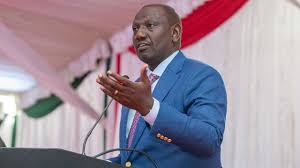At the 38th African Union (AU) Summit in Addis Ababa, Ethiopia, President William Ruto addressed the pressing issue of political instability in Africa.
He emphasized that such instability poses a significant threat to the continent’s governance and economic advancements.
President Ruto urged fellow African leaders to take immediate action to strengthen democratic institutions, highlighting the necessity of safeguarding governance reforms to ensure long-term stability and prevent future crises.
In his speech, President Ruto called upon AU member states to expedite the process of integrating the African Peer Review Mechanism (APRM) into national legislation.
He believes that anchoring the APRM in national laws will secure its financial sustainability, ensure its resilience through political transitions, and enhance its institutional stature.
Kenya has been at the forefront of governance reforms, being the first country to voluntarily undergo a second review under the APRM.
This move demonstrates Kenya’s commitment to accountability and transparency, especially following the 2010 Constitution, which redefined governance through devolution.
The summit, held from February 15 to 16, 2025, brought together heads of state and government from all 55 AU member states.
The central theme was “Justice for Africans and People of African Descent Through Reparations,” focusing on advancing reparatory justice and fostering racial healing across the continent.
Discussions encompassed various topics, including accelerating the implementation of Agenda 2063, prioritizing health equity, harnessing the potential of Africa’s youth, addressing ongoing conflicts, and enhancing climate resilience.
During the summit, President Ruto also met with the outgoing African Union Commission (AUC) Chairperson, Moussa Faki Mahamat.
He acknowledged the AU’s growing role in addressing the continent’s political, economic, and security challenges and commended Faki for his leadership over the past eight years.
President Ruto emphasized the need to continue revamping the organization to make it fit for purpose in effectively dealing with these challenges.
The 38th AU Summit also featured elections for key positions within the organization. Notably, the election for the African Union Commission Chairperson was a significant event, with candidates from various member states vying for the position.
The election underscored the AU’s commitment to democratic processes and the selection of leadership to guide the continent’s future.
In addition to the political discussions, the summit addressed the ongoing conflict in the Democratic Republic of Congo.
Despite being a focal point, diplomatic progress appeared limited due to the defiance of Rwandan President Paul Kagame, who has been accused of backing M23 rebels.
The advance of these rebels in eastern Congo has raised concerns about a potential escalation of the conflict, reminiscent of the deadly wars in the 1990s and 2000s.
The situation remains complex, with various regional and international actors involved.
Overall, the summit highlighted the AU’s dedication to addressing both historical injustices and contemporary challenges.
Through collaborative efforts and a focus on strengthening institutions, African leaders aim to pave the way for a more stable and prosperous future for the continent.


